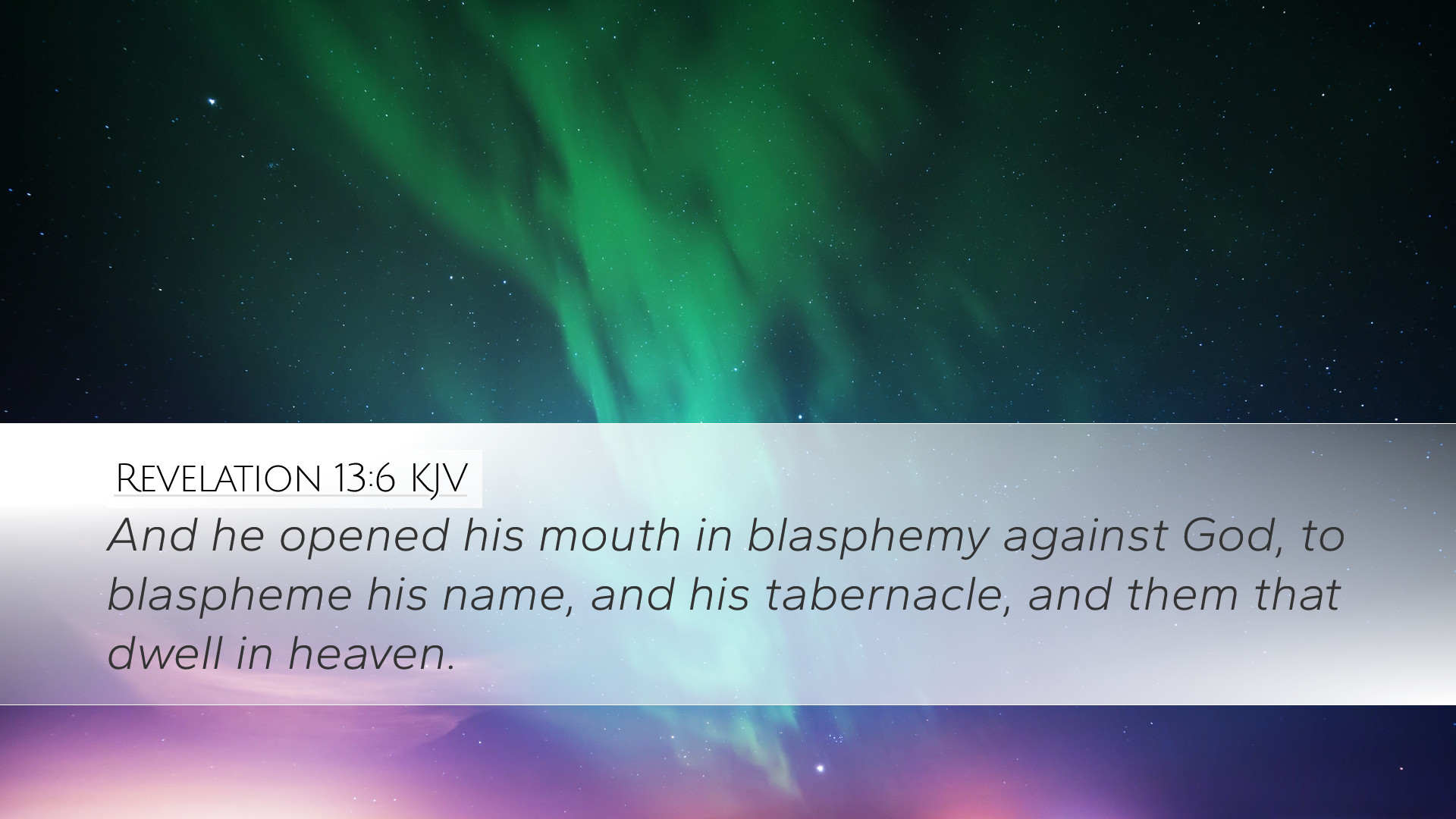Commentary on Revelation 13:6
Revelation 13:6 states: "And he opened his mouth in blasphemy against God, to blaspheme His name, His tabernacle, and those who dwell in heaven."
Introduction
The verse presents a critical moment within the apocalyptic narrative of the Book of Revelation, touching upon themes of blasphemy, opposition to God, and the ultimate challenge against divine authority. Various public domain commentaries provide rich insights into this text, addressing its theological implications, historical context, and its relation to the overall message of Revelation.
The Nature of Blasphemy
Albert Barnes elucidates that the mouth opened for blasphemy signifies a direct confrontation with God's sovereignty. The act of blasphemy encompasses not only verbal denunciation but a total rebellion against God's authority. Such an act is emblematic of the Antichrist's character—marked by arrogance and a relentless pursuit of power at the expense of divine reverence.
Matthew Henry's Observations
- Henry emphasizes that blasphemy often transcends mere speech, leading to acts that undermine God's holiness and character.
- He interprets the blasphemies mentioned not only as attacks on God's name but also as fraudulent claims to divine rights, laying bare the Antichrist's mission to usurp God's place.
Adam Clarke's Interpretation
In his examination, Clarke offers a broader perspective on the adversarial nature of the forces described in Revelation. He posits that the blasphemies extend to God’s tabernacle—a reference to His presence among His people—indicating a profound assault against God's covenant with humanity. Clarke explores the theological ramifications of this blasphemy as a marker of the end times, where moral and spiritual values are upended.
The Context of Revelation 13
This verse is situated within a larger narrative concerning the beast, representing both a political power and a spiritual force antagonistic to God’s people. Barnes suggests that this passage reflects an escalation in spiritual warfare, highlighting how evil manifests in the utter rejection of God’s authority and the promotion of a counter-religion.
Historical Context
Understanding the historical context during which John wrote Revelation is crucial. At the time, Christians faced severe persecution under Roman authorities that often demanded worship of the Emperor. Henry notes that the blasphemies of the beast serve to caution believers against the temptations to accommodate or capitulate to earthly powers that oppose divine law.
Theological Implications
The blaspheming of God's name, His dwelling, and heavenly beings speaks to the broader conflict between good and evil. It underscores the tension between earthly kingdoms and the divine rule of God. Clarke draws attention to the nature of God’s name, which encompasses His character and attributes, suggesting that any assault on it undermines the very essence of what it means to be in covenant with God.
Theological Reflections
- The Authority of God's Name: To blaspheme the name of God is to challenge His authority and the legitimacy of His power.
- The Sacredness of the Tabernacle: The reference to God's tabernacle indicates not just a physical dwelling but the manifestation of God's presence among His people.
- Heavenly Realities: Blasphemy extends towards the heavenly beings, reflecting a complete repudiation of the spiritual order established by God.
Application for Believers
As we reflect on Revelation 13:6, it serves as a sobering reminder for contemporary believers. There are implications not only for understanding eschatological events but also for living out our faith in a world often hostile to God's truth. Henry encourages the church to remain vigilant against cultural or political pressures that may lead to compromise or blaspheme God’s name in our current context.
Practical Considerations
- Be aware of the subtle ways in which modern culture may attempt to reassign meaning to God's name and attributes.
- Uphold the truth of God's word against any such blasphemous discourse.
- Foster a community of faith that recognizes the importance of honoring God’s presence and His truth in all aspects of life.
Conclusion
Revelation 13:6 provides deep insights into the nature of opposition against God’s sovereignty and serves as a powerful admonition to the church. Engaging with the perspectives of commentators such as Matthew Henry, Albert Barnes, and Adam Clarke deepens our understanding of the spiritual realities surrounding this passage and challenges us to uphold the sanctity of God’s name in our lives. As we anticipate Christ's return, may we be reminded of the call to remain steadfast in our faith amidst challenges that seek to undermine our belief in the ultimate authority of God.


